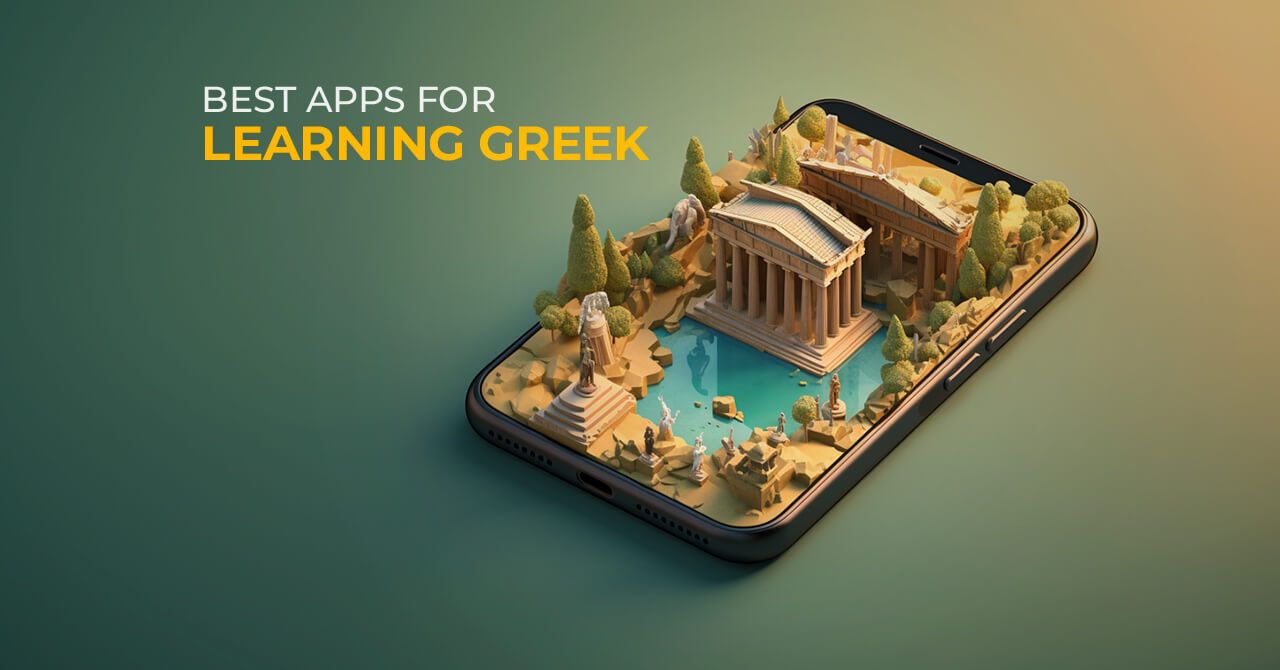
How To Learn Greek From the Very Beginning
Whatever your reasons, if you’re reading this article, then you no doubt want to start learning Greek, so let’s dive straight in.
Do you dream of relaxing in an infinity pool surrounded by the white villages of Santorini? Or are you longing to see Ancient Greek history with your own two eyes at the Parthenon? Or maybe you’re just tempted to learn Greek, one of the world’s most ancient languages that is still spoken today! Whatever your reasons, if you’re reading this article, then you no doubt want to start learning Greek, so let’s dive straight in.
What is the best way to learn Greek for beginners?
If you can neither say nor understand more than a couple of Greek words, then you are a true beginner. Fortunately, you can learn Greek from the very beginning at any age.
Start with the alphabet 🔤
The best place to start with any language is the alphabet. You have no doubt heard of Alpha, Beta, and Gamma. You probably also know Delta, like the airline, Omicron, like the variant of Covid, and Kappa, the sportswear brand. All of these are actually letters in the Greek alphabet.
How to learn the Greek alphabet
The Greek alphabet is completely different from the Roman alphabet that we use in English. It is made up of 24 letters, including 7 vowels and 17 consonants. It was the first alphabet to include vowels, making it a significant linguistic innovation. You can learn the alphabet with flashcards, where you write the name of the letter on one side plus the uppercase and lowercase symbols on the other side. Play memory games with the flashcards or place them around your home, and every time you see one, you must say the letter name, sound, or picture the symbol before turning it over to check your pronunciation.
Learning Greek digraphs and diphthongs
Once you’ve learned to read Greek letters, then you can move on to digraphs. These are pairs of letters that are pronounced with one sound, such as “ea” in the English words meat, seat, and beat.
These are the modern Greek digraphs:
- αί
- εί
- οί
- υί
- αύ
- εύ
- ηύ – rare
After digraphs, you will need to familiarize yourself with diphthongs. A diphthong is a linguistic term describing a complex vowel sound formed by the smooth combination of two distinct vowel sounds within the same syllable. Here are the modern Greek diphthongs:
- αη
- οη
- αϊ/άι
- οϊ/οι
It’s very easy for beginners to familiarize themselves with Greek words and sounds, but if you don’t learn the alphabet, digraphs, and diphthongs, then you will find yourself coming to a halt and not being able to progress as much as you would like. In this case, you should go back to basics and try to really learn the alphabet by heart. Knowing these elements will enable you to read every Greek word and, therefore, learn the language as a whole.
The best way for “false beginners” to learn Greek 💡
A false beginner is a term that refers to people who may seem like beginners in a language but have some prior knowledge or experience, making them more advanced than a true beginner. If you wouldn’t feel confident going into a restaurant and ordering food, but you do understand a few words, then you are probably what we would consider a false beginner.
Having some prior knowledge of a language may seem like an advantage, but it can leave you unsure of what to do next or how to progress. In this case, you should look into taking lessons.
How to learn Greek fast: Take private lessons 🧑🏽💻
Private lessons are one-to-one classes with a qualified tutor, either in person or online, using websites such as LiveXP. The classes are tailored to your individual needs, which means you will work towards your own specific goals rather than following a general, broad curriculum. False beginners can get a push in the right direction, and you can even ask your tutor to set tasks for you to complete outside of lessons to advance your Greek even further.
Individual lessons are ideal for homebodies, introverts, or just those with a busy schedule who can’t make it to regular group classes. If you’d rather learn surrounded by others, then you would be better suited to other options…
How to learn to speak Greek: Group lessons
If you feel motivated and encouraged to learn by being in a group environment, then you could join a class at your local language school. Group settings can make you feel less alone and also hold you accountable, so you’re less likely to miss a class or forget to do your homework than if you were alone.
This type of class is ideal for social butterflies who enjoy the friendly, social aspect of school. However, they aren’t suited for the more shy individuals among us. Unfortunately, with only around 13 million Greek speakers worldwide, Greek schools aren’t as prevalent as other language schools, so it may be easier to find a native speaker to tutor you online.
How to learn Greek at home 🏡
Understanding Greek
The expression “it’s all Greek to me” is used to say that a subject is too complicated to understand. That’s because Greek is a complex language, but that doesn’t mean it’s impossible to learn. Once you’ve learned the alphabet and can start reading words, you should try listening to them too. This can be done by watching videos with subtitles so that you can simultaneously read a word and hear its pronunciation. Most music and video platforms have a “speed” setting, which you can adjust to make the audio faster or slower. Slowing down the spoken language enables you to understand individual words more clearly and, therefore, gain a better understanding. Once you start understanding a higher percentage of words, you can either turn off the subtitles or speed up the audio to make it more challenging.
After watching movies, you can discuss them to practice Greek with your native-speaking tutor on LiveXP. Your tutor can help you understand and answer your questions in real time. What’s more is that you can find a tutor with a specific accent or dialect, for example, northern Greek, southern Greek, or even Cypriot.
How to learn the Greek language
Play games
When starting out learning a new language, it’s important to have fun. Having fun while learning any subject prevents you from becoming disheartened or losing motivation. One way to stay entertained while studying the Greek language is by playing games. Vocabulary games tend to be multiple-choice questions or memory games, as these kinds of games stimulate your brain, encouraging learning without any strenuous thought, which could be off-putting to beginners.
You could try the Word Trainer by LiveXP, available in the app, which uses the spaced repetition method. This learning technique involves reviewing information at increasing intervals over time, thus optimizing vocabulary retention. That might sound complex, but it’s actually very simple; you play a game, and your brain memorizes Greek vocabulary in the most effective way.
Focus on one area at a time
Once you’ve learned the Greek alphabet and are getting more confident reading Greek words, and you’ve started playing games, listening to music or audio in Greek, and have maybe even started taking lessons, then you should start to target one specific area of the Greek language.
Instead of trying to work your way through every single verb, every tense, or every vocabulary list, you should narrow down the parts of the language you need to study by choosing a specific goal. For example, if you’re going on vacation in Greece, then you could concentrate on tourism and hospitality vocabulary. If you’re going to be studying abroad, then you should focus your attention on education-related vocabulary as well as the topic of your studies. You may also want to learn Greek to help you in your field of work or area of expertise, especially if it’s one that uses a lot of Greek words such as philosophy (including the word “philosophy” itself).
Once you’ve determined your target area of study, you can learn the jargon or terminology related to that subject, along with the most common verbs. Try to play games using flashcards or on an app such as the LiveXP Word Trainer to really embed the words in your memory.
What is the hardest thing about learning Greek?
Mastering the Greek alphabet and adapting to a different writing system can pose initial challenges for learners, which is why we recommend starting with the alphabet before trying to learn any other part of the Greek language. After that, the intricate system of verb conjugations, noun declensions, and grammatical structures tend to be considered the hardest part of learning Greek, as there is an extensive and varied set of verb forms.
You already know more Greek than you think
Ancient Greece profoundly influenced modern life through contributions to philosophy, politics, literature, art, and science. Concepts such as democracy, the scientific method, and philosophical ideas continue to shape contemporary societies and intellectual thought.
As a result, Ancient Greece also influenced the English language. Many English words, especially in academic and technical fields, are derived from or influenced by Ancient Greek terms, reflecting the enduring legacy of Greek thought and culture. Let’s take a look at a few examples…
- Philosophy: the word itself comes from the Greek word “philosophia,” meaning “love of wisdom.”
- Democracy: this comes from “dēmokratía,” meaning “rule of the people.”
- Theology: “theología” means “study of God.”
- Biology comes from two words: “bíos,” meaning “life,” and “logos,” meaning “study” or “science.”
- Physics: “physis” means “nature.”
- Chemistry: “kheimeia” refers to “mixing” or “pouring together.”
- Anatomy: “anatome” means “dissection.”
- Pharmacology: “pharmakon” means “drug” or “medicine.”
- Geometry: “geōmetría” means “earth measurement.”
- Trigonometry: “trigonon” means “triangle,” and “metron” means “measure.”
- Metaphor: “metaphora” means “transfer” or “carry over.”
- Phonetics: “phōnē” means “voice” or “sound.”
- Marathon: Named after the Battle of Marathon in Ancient Greece.
- Odyssey: Named after Homer’s epic poem “The Odyssey.”
All of these words are of Greek origin, proving that you do, in fact, already know more Greek than you thought. As you can see, the Greek language has influence in various domains, from literature to mathematics, medicine to philosophy.
Why learn Greek?
Are you still unsure as to whether or not you should learn Greek? Let’s take a look at some of the reasons why it could be beneficial to you.
Citizenship 🪪
If you have been living in Greece or Cyprus for a while now, you may noticed that English is enough and you can do without speaking Greek. But if you plan to be naturalized and obtain Greek or Cypriot citizenship, you must speak Greek. Cyprus is a fast-developing country with lots of IT companies located there and foreign IT professionals from around the world living there. The majority of them are interested in obtaining a Cypriot passport. Among the requirements, Greek language proficiency is a must.
Talking about Cyprus, recently, the government has changed the terms of the naturalization process. If foreign experts have been living in Cyprus for 4-5 years and can speak Greek at A2-B1 levels, they have great chances of getting Cypriot citizenship much faster than before. They will have to pass the language proficiency exam according to CEFR requirements. So, if you have just moved to Cyprus or have been living there for a while, it’s time to start learning Greek. It’s more than realistic to master the language at A2-B1 levels to pass the exam. It will help not only in obtaining citizenship but also in understanding the nation, its culture, and traditions, to understand the country you live in.
At LiveXP, you can find not just Greek tutors but also those who specialize in preparing for the citizenship exam. Don’t miss the chance to learn Greek in the most effective way.
Understanding and widening your vocabulary 📚
We have already seen a small example of the words we have borrowed from Greek. Did you know that up to 30% of English words have roots in the Greek language? Notably scientific, medical, philosophical, and academic terms. Learning Greek can help you understand the origin of words we use in day-to-day language, as well as introduce you to new words, thus widening your vocabulary. Learning Greek provides a distinctive perspective on language structure and etymology, which can be beneficial for language enthusiasts.
History ⏳
Learning Greek can provide valuable insights into the foundations of Western civilization. You can discover the origins of democracy, philosophy, and scientific thought, fostering a deeper understanding of cultural and intellectual heritage. Many famous texts were written in Ancient Greek, so you could read them as they were intended to be read, as we shall see below…
Ancient culture and texts 📜
Studying Greek enhances linguistic skills and offers access to ancient texts, enriching your appreciation for literature and history. The Greek language can expose you to a rich tapestry of ideas that have shaped the world for millennia. There are many renowned Ancient Greek authors whose works you could read in their original language and tone if you could read Greek without the influence of translators. Here are just a few examples:
- Homer (c. 8th century BCE): Known for the epic poems “The Iliad” and “The Odyssey,” which are foundational works in Western literature.
- Herodotus (c. 484–425 BCE): Often called the “Father of History” for his historical writings, including “Histories.”
- Thucydides (c. 460–395 BCE): Noted historian, best known for his work “History of the Peloponnesian War.”
- Plato (c. 428–348 BCE): Philosopher and student of Socrates, his dialogues, like “The Republic,” are foundational in Western philosophy.
- Aristotle (384–322 BCE): Student of Plato and a major figure in philosophy, his works cover a wide range of subjects, including “Nicomachean Ethics” and “Politics.”
These authors played a crucial role in shaping the literary, dramatic, and philosophical traditions of Western civilization.
For better brain power 🧠
Let’s be honest, learning Greek cannot be considered easy. That’s why it can be intellectually stimulating, offering a challenge that sharpens analytical skills and expands cognitive abilities.
Culture and travel 🛫
Moreover, learning Greek fosters a connection with a vibrant living culture. While studying Ancient Greek provides insights into historical texts, acquiring modern Greek allows for communication with the people of Greece and Cyprus. It can create opportunities for cultural exchange and collaboration with Greek-speaking communities around the world. Furthermore, mastering Greek may provide unique insights for travelers exploring Greece, resulting in a deeper appreciation for the language’s cultural nuances.
If that doesn’t convince you, then I don’t know what will! Don’t put it off any longer. If your resolution in 2024 is to learn a new language, then go ahead and get started now.
Hello! My name is Beth. I'm from France. I'm a French and English native speaker and I really like writing.

